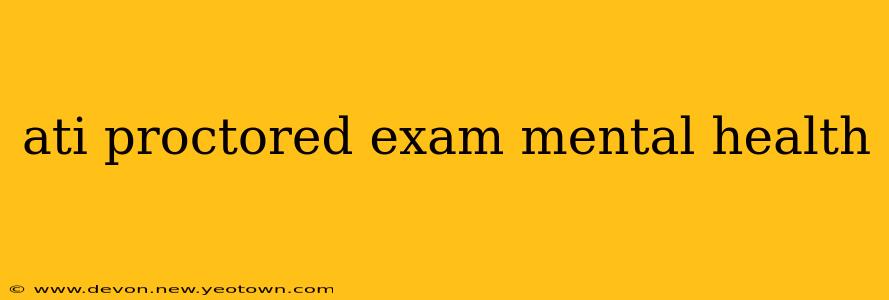The ATI Proctored Exam looms large for many nursing students, a crucial hurdle on the path to becoming a registered nurse. While the entire exam is demanding, the mental health section often causes the most anxiety. This isn't surprising; mental health is a complex and nuanced field, requiring both knowledge and empathy. This isn't just about memorizing facts; it's about understanding the human experience of illness and applying that understanding to patient care. Let's delve into the common anxieties surrounding this section and arm you with strategies for success.
What are the Common Challenges with the ATI Mental Health Section?
Many students find the ATI mental health section challenging because it tests not just theoretical knowledge but also clinical judgment and critical thinking. It demands a deep understanding of various mental health disorders, their symptoms, appropriate interventions, and ethical considerations. The scenarios presented can be complex, requiring you to analyze multiple factors simultaneously. This goes beyond simply identifying a diagnosis; it requires you to predict potential complications, devise effective care plans, and anticipate patient responses.
How is the ATI Mental Health Section Structured?
The ATI mental health section typically covers a wide range of topics, including:
- Major mental health disorders: This includes conditions like depression, anxiety disorders, schizophrenia, bipolar disorder, obsessive-compulsive disorder (OCD), and personality disorders. You need to be familiar with their diagnostic criteria, symptoms, and common treatment approaches.
- Psychopharmacology: A solid understanding of common psychotropic medications, their mechanisms of action, side effects, and potential interactions is crucial.
- Therapeutic communication: This is a cornerstone of mental health nursing. You will be tested on your ability to establish rapport, actively listen, and use appropriate verbal and nonverbal communication techniques.
- Safety and crisis intervention: Knowing how to recognize and respond to escalating situations, manage aggressive behavior, and ensure patient safety is essential.
- Legal and ethical considerations: Understanding concepts like informed consent, patient confidentiality (HIPAA), and involuntary commitment is vital.
- Family dynamics and support systems: The impact of family and social support on mental health recovery is significant, and the exam often assesses your understanding of this aspect.
What are Some Common Mental Health Disorders Tested on the ATI Exam?
The ATI exam thoroughly covers major mental health disorders. Expect questions on:
- Depression: Know the different types of depressive disorders, their symptoms (cognitive, emotional, behavioral), and appropriate interventions, including both pharmacological and non-pharmacological approaches.
- Anxiety Disorders: Understanding the various anxiety disorders (generalized anxiety disorder, panic disorder, social anxiety disorder, phobias, etc.), their symptoms, and treatments is critical.
- Schizophrenia: Be prepared to answer questions about the positive and negative symptoms, the stages of the illness, and medication management.
- Bipolar Disorder: You should be familiar with the manic and depressive phases, treatment options (mood stabilizers, antipsychotics), and strategies for managing mood swings.
- Obsessive-Compulsive Disorder (OCD): Understand the obsessions and compulsions, their impact on daily life, and treatment modalities (exposure and response prevention, medication).
How Can I Best Prepare for the ATI Mental Health Section?
Preparation is key! Here's a multifaceted approach:
- Thorough Review of Course Materials: Go back through your textbooks, lecture notes, and any supplementary materials. Pay close attention to diagnostic criteria, treatment plans, and medication information.
- Practice Questions: Utilize ATI practice exams and other resources to familiarize yourself with the question format and types of scenarios presented. Analyze your mistakes to identify areas needing improvement.
- Focus on Therapeutic Communication: Practice applying different communication techniques, such as active listening, empathy, and setting boundaries. Role-playing with a classmate can be invaluable.
- Understand Legal and Ethical Considerations: Review relevant laws and regulations related to mental health care, including patient rights and responsibilities.
- Simulate Exam Conditions: Take practice exams under timed conditions to get used to the pressure of the actual exam.
What are Some Tips for Success on the Day of the Exam?
- Get Enough Sleep: Adequate rest will improve your focus and cognitive function.
- Eat a Balanced Meal: Fuel your brain with nutritious food.
- Manage Your Anxiety: Practice relaxation techniques to calm your nerves.
- Read Each Question Carefully: Don't rush; take your time to understand what's being asked.
- Eliminate Incorrect Answers: If you're unsure of the answer, try to eliminate options that are clearly wrong.
The ATI Proctored Exam's mental health section can feel daunting, but with dedicated preparation and a strategic approach, you can conquer it. Remember, it's not about memorizing facts alone but about applying your knowledge to real-world scenarios. Good luck!

